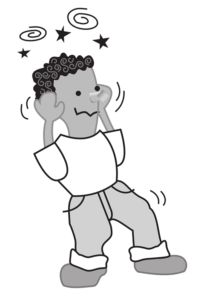We are all so willing to take the word of others at face value, whether it be from a doctor, chiropractor, dietician, blogger, someone in gluten free food service, social media or an app. Often, we take the word of other people, instead of doing our own homework.
We Trust:
- Medical professionals know everything about everything and so we don’t question them.
- The blogger has done their homework/research.
- People making gluten free foods understand the laws and what gluten free means and they are following proper procedures.
- Gluten free community events like expos are always 100% safe.
- People on social media like Facebook know what they are talking about and have asked all the right questions.
- Apps that help you find products, restaurants and other gluten free things.
Seriously?!
Let’s start with doctors and other medical professionals:
 There is no way for any doctor, even those who are specialists to know everything about everything and expect them to always give you accurate information. That sentence contains a lot of absolutes!
There is no way for any doctor, even those who are specialists to know everything about everything and expect them to always give you accurate information. That sentence contains a lot of absolutes!
If you have been gluten free for many years, you know the struggles patients have had with doctors! (Perhaps you have run into some who still are using old information) For many years, medical schools have been teaching the wrong information about celiac disease!
Examples of misinformation that has been taught:
- It is a childhood illness
- All children with celiac will look malnourished with extended bellies
- You outgrow celiac
- It only affects the GI tract
- Everyone with celiac is very thin
Unfortunately, many doctors continued education comes from the pharmaceutical companies as drug representatives talk to them about drugs that can help their patients. These representatives talk about different illnesses and explain how the drugs can help patients and sell the doctor on using those medications for their patients.
Celiac and gluten intolerance doesn’t have a drug, yet. Personally, I am glad for this, because many times the side-effects are worse than the original problem. (My humble opinion) However, because of there not being a drug, celiac has not been talked about and many doctors still don’t think gluten intolerance is a real condition! So, between being taught old information and not hearing any more about celiac/gluten intolerance doctors often lag behind.
My plug for support groups:
I have been a support group leader for over 10 years. Recently, I was disheartened when I was working at an expo and someone told me they would never go to a depressing support group. Is this why people shy away from support groups?! My experience both before and in being a support group leader has been very positive, helpful and educational.
A support group does the following:
- connects you with others going through the same thing
- most of the time, people living with the disease have a better understanding and better information than your doctor does
- something special happens talking to people in person- discoveries are made about things you thought you knew and didn’t know you needed to know
- information on topics
- speakers knowledgeable about issues, treatment, nutrition and more
- samples of gluten free foods and products
- a place where people understand how hard it can be at times and leave you feeling rejuvenated and able to conquer being gluten free and living with a chronic auto-immune disease
Here is how you can find a support group or start one yourself.
I still recommend doing your own homework, because even a seasoned support group leader sometimes doesn’t have accurate information. They are doing their best and trying to stay up to date, but there is so much, it is hard. We need to help one another!
Trusting Gluten Free Bloggers
Let’s face it! There is a lot of information out there, true and untrue. Wading through it can be difficult and confusing. This is probably why we want to trust others with the “facts” they have found.
Check the sources of information from those you read. Where are they getting their information? Is it coming from other bloggers as a word of mouth information, is it an opinion or are there legitimate sources?
I’m not saying that it is bad for bloggers to cite one another’s posts or that it isn’t true if it is cited from one place over another. What I am saying is that you need to use your best judgment from everything you read. Be careful about taking anyone’s word as absolute truth.
I believe most bloggers are trying to give accurate, well thought out, good information that will help others. We are all human and make mistakes or misunderstand things. So, keep that in mind.
This post contains affiliate links. I include these links for your convenience. I earn a small commission for the referral, but your price remains the same.
Trusting Gluten Free Events
 Yes, there is an expectation to trust that when going to a gluten free event, like an expo, that everything at that expo is going to be safe. Having put on events like an expo and participating as a vendor I know how strict the rules are. However, even with the strict rules, sometimes one vendor will slip through that shouldn’t be at the event.
Yes, there is an expectation to trust that when going to a gluten free event, like an expo, that everything at that expo is going to be safe. Having put on events like an expo and participating as a vendor I know how strict the rules are. However, even with the strict rules, sometimes one vendor will slip through that shouldn’t be at the event.
If that rogue vendor continues to show up at events I would question organizers and their motives for doing such events. It’s a one shot deal, for the vendor, unless serious steps are taken to rectify the problems.
My Recent Expo Experience with a Rogue Vendor
I was running an information/education booth at our local expo, last weekend. At the end, as I was cleaning up, another vendor approached me (to tell you the truth), he was fairly rude from the get-go! He wanted to know what I was selling and when I said I was selling nothing, he pressed me and had a hard time letting it go, because I had to be selling something! (My booth is non-profit- information and education!)
Next, he tried to get me to agree that there are different strains of wheat and that some of them are more safe than others. Nope! Any wheat in any form should NOT be ingested by those with celiac or gluten intolerance! He did not like my answers and became more aggressive. It became clear in talking to him that he has no understanding of celiac or gluten intolerance. (Since the expo, I have checked out his web-site and he believes that yeast (quick rising) has caused gluten intolerance. That is a new one I haven’t heard before!)
Another alarming thing he said, is that gluten free isn’t cut and dry, but rather a LOT of gray area. Yikes! The gluten free regulations (FDA) are pretty cut and dry without gray areas! (More about the labeling laws) I warned him that other bakers have been prosecuted for selling products that are marked gluten free, but are not. He said he makes no gluten free claim, which isn’t true because it is all over his web-site. Perhaps he was talking about his other breads? I don’t know since he talked in circles.
What this quick homework session reveled
It became clear that he is a danger to the gluten free community. He only has one truly gluten free product and that is sourdough. However, his kitchen processes make that debatable. (I wouldn’t even sample it, let alone eat it!) I had someone tell me, he told her, at the expo, any gluten or gluten contamination bakes out during his process. (Here we go again! Someone who has a magic oven!)
Talk to the vendors, talk to companies, check out their websites and ask questions. You never know what someone’s agenda really is and asking questions helps to ferret out those that are just on the band wagon.
What I don’t understand is why someone would be willing to make people horribly sick and cause damage to them just to make a buck!
Actually, I think I do know why, they don’t believe it is real. The disease, the intolerance, the symptoms, and the effects of eating gluten.
Trusting Social Media sites and pages
Are we really so quick to take the word of people on a page? We know nothing about them.
- Do they have celiac or gluten intolerance or are they gf for other reasons, which may not have anything to do with gluten free health issues?
- Did they not get sick because they are doing it for other health reasons?
- Inversely, was this just one bad experience? (It does happen, even to good places.)
- What questions did they ask, do they know the right questions to ask?
- Who did they talk to? I have had experiences where they have changed our server to someone who knows gluten free, instead of the new staff member.
- Is this person overly or under concerned about answers. I might feel differently asking the same questions.
Trusting Apps
There are a lot of different apps and devices that can help with finding gluten free foods and products. They are so helpful. However, are we relying on them too much?!
Nima Sensor
This is a great tool, but it does have its draw backs. The Nima Sensor can give false negatives and false positives. It also may not be helpful in detecting cross contact. Though it can give a little more of a sense of security when eating out. However, that doesn’t mean you should stop asking questions. Always ask questions and make sure your server and/or chef understands that you are gluten free and what that means.
Gluten free apps
These apps can be helpful in finding products and restaurants. Reviews are by those who use the apps and comment. If you solely take the word from comments on these apps you will likely be led astray.
I love and frequently use Find Me Gluten Free! We have found great places using this app, especially when we are on vacation! However, we had a horrible experience following the advice to go to HuHot. (And it’s update here. No more has been done about them, it is disappointing.)
Everyone said HuHot was a great place to go and safely gluten free. However, as we asked questions I was confused by their menu:
“ALL LISTED SAUCES ARE GLUTEN FREE AND MSG FREE.
Wheat has been processed to meet FDA standards for Gluten Free foods.”
What process? I quickly discovered they use hydrolyzed soy sauce, which is NOT considered safe! In asking other questions we became more and more leery about eating there and left. This led me to doing more homework about HuHot, the FDA laws and contacting the Gluten Free Watchdog.
Do Your Own Homework!
 Your health is in your hands!
Your health is in your hands!
- Ask your own questions, do some research, get to know the ins and outs of gluten free and the conditions related to why people are gluten free.
- Join a support group
- Know how to safely eat out and what questions to ask. Here is a great article on how to dine out safely.
- Learn about shared kitchen safety. (The article is about roommates, but the same principles apply to other kitchens.) It takes a puff of flour 3 hours to settle, but gluten can linger in the air for as long as 24 hours.
- Don’t rely solely on others opinions for your information.
- Use your own intuition and knowledge to make the best choices for you and your health.

















 I like Kirkland’s ham, from Costco, for making these. Also, I like the 1 oz cream cheese packets (I find them at Costco, too). It is easy to use and just the right amount! I do recommend letting the packets sit out for a little while to come closer to room temperature, making the cream cheese easier to spread.
I like Kirkland’s ham, from Costco, for making these. Also, I like the 1 oz cream cheese packets (I find them at Costco, too). It is easy to use and just the right amount! I do recommend letting the packets sit out for a little while to come closer to room temperature, making the cream cheese easier to spread.












 Like I said, it is an umbrella term. These conditions effect the function of the autonomic nervous system. So, we are talking about, the things your body just does, without you thinking about and they happen automatically. Some examples are: dilation of pupils, lung function, heart rate, blood pressure, etc. When the body isn’t properly regulating itself you can have heart palpitations, shallow breathing, anxiety, fainting, feel light headed, have malnutrition and more.
Like I said, it is an umbrella term. These conditions effect the function of the autonomic nervous system. So, we are talking about, the things your body just does, without you thinking about and they happen automatically. Some examples are: dilation of pupils, lung function, heart rate, blood pressure, etc. When the body isn’t properly regulating itself you can have heart palpitations, shallow breathing, anxiety, fainting, feel light headed, have malnutrition and more. The signs and symptoms can be subtle and/or look like a symptom of many, many other issues. At
The signs and symptoms can be subtle and/or look like a symptom of many, many other issues. At  This is the most common form of dysautonomia and what most people are diagnosed as having. Neuro means it has to do with the nervous system; Cardio means it has to do with the heart; genic means it is causing or forming something and syncope literally means to faint. So, the nervous system is malfunctioning and causing the heart to beat faster because blood pressure has dropped, causing you to be light headed, dizzy or faint.
This is the most common form of dysautonomia and what most people are diagnosed as having. Neuro means it has to do with the nervous system; Cardio means it has to do with the heart; genic means it is causing or forming something and syncope literally means to faint. So, the nervous system is malfunctioning and causing the heart to beat faster because blood pressure has dropped, causing you to be light headed, dizzy or faint. This presents a lot like Parkinson’s disease and typically shows up after age 50. MSA is characterized by widespread nerve damage causing lots of problems, in lots of areas of the body. This means, symptoms can be in any part of the body. For a more comprehensive understanding of this condition please go to
This presents a lot like Parkinson’s disease and typically shows up after age 50. MSA is characterized by widespread nerve damage causing lots of problems, in lots of areas of the body. This means, symptoms can be in any part of the body. For a more comprehensive understanding of this condition please go to 
 Benefits to Cooking at Home
Benefits to Cooking at Home You don’t have to worry about whether or not the people handling your food, understand how to properly handle your food! Gloves must be changed! Fresh ingredients that haven’t had a chance for gluten to be introduced should be used. Do NOT make my food on the same counter you just had gluten. You can’t brush off gluten crumbs and then touch gluten free foods.
You don’t have to worry about whether or not the people handling your food, understand how to properly handle your food! Gloves must be changed! Fresh ingredients that haven’t had a chance for gluten to be introduced should be used. Do NOT make my food on the same counter you just had gluten. You can’t brush off gluten crumbs and then touch gluten free foods. We have tried to make dinner more of a family time. It was more challenging when we were eating out frequently. Grabbing a meal in the car and running from place to place. Sure you are together, but it isn’t always as meaningful as when you are sitting face to face and talking.
We have tried to make dinner more of a family time. It was more challenging when we were eating out frequently. Grabbing a meal in the car and running from place to place. Sure you are together, but it isn’t always as meaningful as when you are sitting face to face and talking.
 It is expensive to eat out. Often more expensive if you are gluten free. Gluten free ingredients often cost more than other ingredients, especially if they are buying only a few buns or bread to keep in stock. Often, the more you buy, the more you save, especially in retail. If places don’t get a lot of gluten free customers, they don’t buy as much and don’t receive the same kick backs as places that buy in higher quantities. Therefore, it is more expensive for them to stock gluten free specialty items.
It is expensive to eat out. Often more expensive if you are gluten free. Gluten free ingredients often cost more than other ingredients, especially if they are buying only a few buns or bread to keep in stock. Often, the more you buy, the more you save, especially in retail. If places don’t get a lot of gluten free customers, they don’t buy as much and don’t receive the same kick backs as places that buy in higher quantities. Therefore, it is more expensive for them to stock gluten free specialty items. My stance on cooking at home is that if I have to go to all that work, it better taste good! I love Pinterest! I love all of the ideas. I don’t count out the gluten recipes. If something looks good, I see how I can modify it. Does it just need a gf pasta or gf bread? What are my options for making it gluten free?
My stance on cooking at home is that if I have to go to all that work, it better taste good! I love Pinterest! I love all of the ideas. I don’t count out the gluten recipes. If something looks good, I see how I can modify it. Does it just need a gf pasta or gf bread? What are my options for making it gluten free? Like I said, I am not opposed to eating out. I love to eat out and would rather eat out than have the mess at home.
Like I said, I am not opposed to eating out. I love to eat out and would rather eat out than have the mess at home. The Gluten Intolerance Group
The Gluten Intolerance Group




 When you have celiac, gluten intolerance, a wheat allergy or some other medical issue that causes you to need to eat gluten free, there are no holidays from gluten free eating. There is no “just a little bit” because, “Yes! A little bit will hurt!!!”.
When you have celiac, gluten intolerance, a wheat allergy or some other medical issue that causes you to need to eat gluten free, there are no holidays from gluten free eating. There is no “just a little bit” because, “Yes! A little bit will hurt!!!”. In the event that your host is unwilling to work with you or leaves you feeling like you don’t dare eat anything when you go, here is plan B. Alert your host that you will be bringing your own food, because you want to enjoy being with everyone, but really don’t want to get sick. Be sure to not make them feel guilty about you doing this. Emotions are already high during the holidays and you don’t need this to be a source of contention.
In the event that your host is unwilling to work with you or leaves you feeling like you don’t dare eat anything when you go, here is plan B. Alert your host that you will be bringing your own food, because you want to enjoy being with everyone, but really don’t want to get sick. Be sure to not make them feel guilty about you doing this. Emotions are already high during the holidays and you don’t need this to be a source of contention. Remember to be thankful this Thanksgiving.
Remember to be thankful this Thanksgiving.
 We have gone places where we know they offer gluten free, but the server or seater gives us a blank stare and doesn’t know what we are talking out. Especially, if you are uncomfortable with your server, make sure you talk to the manager and /or chef. Ask them what they would recommend for gluten free options.
We have gone places where we know they offer gluten free, but the server or seater gives us a blank stare and doesn’t know what we are talking out. Especially, if you are uncomfortable with your server, make sure you talk to the manager and /or chef. Ask them what they would recommend for gluten free options. Even if you go somewhere frequently, it is good to remind them of things that should be done. Especially with fast food. They tend to be kids, working in those places and may have a tendency to get lax on things. Also, high turn over and sometimes the training for gluten free is on the job; figuring it out with the customers.
Even if you go somewhere frequently, it is good to remind them of things that should be done. Especially with fast food. They tend to be kids, working in those places and may have a tendency to get lax on things. Also, high turn over and sometimes the training for gluten free is on the job; figuring it out with the customers. I hope these tips help you in having a happy and safe dining experience. What other questions do you ask when eating out?
I hope these tips help you in having a happy and safe dining experience. What other questions do you ask when eating out?
 Graham is literally a whole wheat flour! The inventor of
Graham is literally a whole wheat flour! The inventor of 
 There are a lot of breads especially flat breads that can be made from gram/chickpea flour. Check out the links below for a few recipes and ideas.
There are a lot of breads especially flat breads that can be made from gram/chickpea flour. Check out the links below for a few recipes and ideas.
 There is no way for any doctor, even those who are specialists to know everything about everything and expect them to always give you accurate information. That sentence contains a lot of absolutes!
There is no way for any doctor, even those who are specialists to know everything about everything and expect them to always give you accurate information. That sentence contains a lot of absolutes! Yes, there is an expectation to trust that when going to a gluten free event, like an expo, that everything at that expo is going to be safe. Having put on events like an expo and participating as a vendor I know how strict the rules are. However, even with the strict rules, sometimes one vendor will slip through that shouldn’t be at the event.
Yes, there is an expectation to trust that when going to a gluten free event, like an expo, that everything at that expo is going to be safe. Having put on events like an expo and participating as a vendor I know how strict the rules are. However, even with the strict rules, sometimes one vendor will slip through that shouldn’t be at the event. Your health is in your hands!
Your health is in your hands!

Recent Comments